Review: ORLANDO: A Revolutionary, Radical New Opera Blends Art With Activism at Vienna State Opera
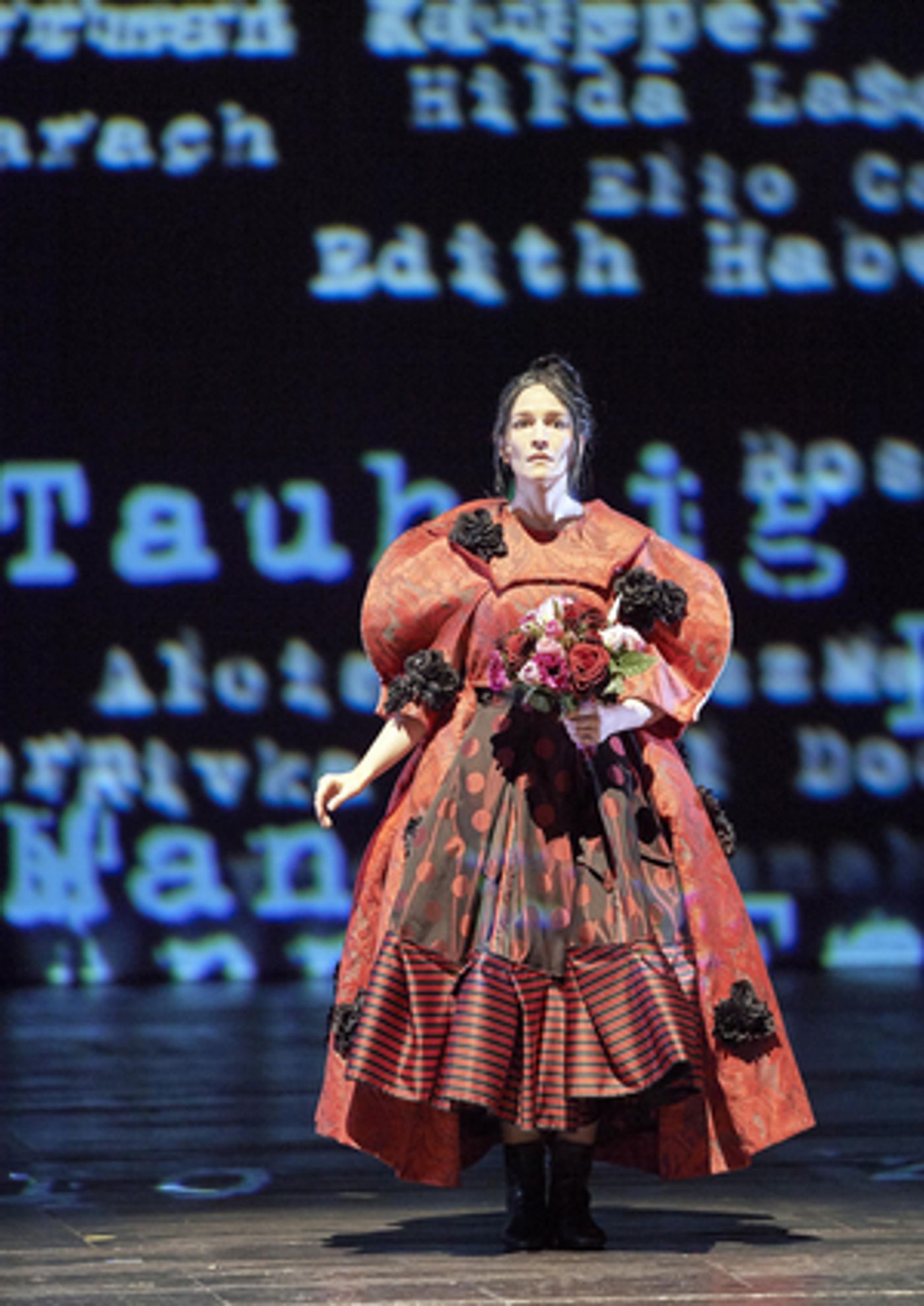
(c) Wiener Staatsoper / Michael Pöhn
The titular character of the genre and gender-bending, time-traveling and era-encompassing Orlando - from Virginia Woolf's seminal, fanciful work of biographical fiction - served as an on-the-zeitgeist and appropriate subject matter for the radical and revolutionary new opera which debuted at the Wiener Staatsoper (Vienna State Opera) on December 8, 2019, and made its final bow on the occasion of Winter Solstice. This history-making world premiere marked a major turn for the acclaimed European opera house - it is the first work by a female composer and librettist, Olga Neuwirth (co-penned with Franco-American author and playwright Catherine Filloux), to be commissioned by director Dominique Meyer for the Wiener Staatsoper in over 150 years. And not just any woman, Neuwirth is an Austrian-born queer woman with an edgy, unconventional punk rock sensibility and approach to her art. At a time when we are about to enter the next decade and the word of the year, according to Merriam-Webster, is "they" (implying the preferred non-binary pronoun that signifies neither male nor female gender specifically but typically a combination of both), there hardly seems a more suitable figure than that of Orlando to usher in a new era of art and activism, even in the world of opera which tends to feel set in its ways and cling to traditions of the past.
Woolf's Orlando may not have been the first or the only (and most certainly not the last) novel to explore the role of gender and how men and women fit into society, but it is likely one of the earliest to investigate those complex discoveries within a single person who has experienced both. For Orlando was born a man in Elizabethan England and wakes up one day magically transformed into a woman who continues their days in the female form through the present-day (then 1928) without losing a sense of their former self and memories of being a man. The observations of the similarities and differences between the two sexes Woolf presents from the mind of Orlando are striking and hold profoundly true, from the seemingly surface musings about attire, fashion, and vanity to awareness of deeper needs, expressions of feelings and the enforced roles one is expected to play, like it or not. It's a walk ten thousand miles in another's shoes (which are much more uncomfortable for a woman) sort of adventure that could well be regarded as the first major (if unofficial) trans character in literature. Upon my re-reading the descriptions of Orlando's experiences and memories of being both sexes in Woolf's novel for research, their reactions and how others perceived them were similar to real-life accounts I've heard from trans friends. "Everything is based in Virginia Woolf's daring book where she is questioning the binary system of gender and sexuality also - everything is open or should be open - because a human being should be free to choose how to live and also how to create art at the same time," Neuwirth proclaimed, "So this freedom of decision becomes a part of gender, sexuality, life and art.
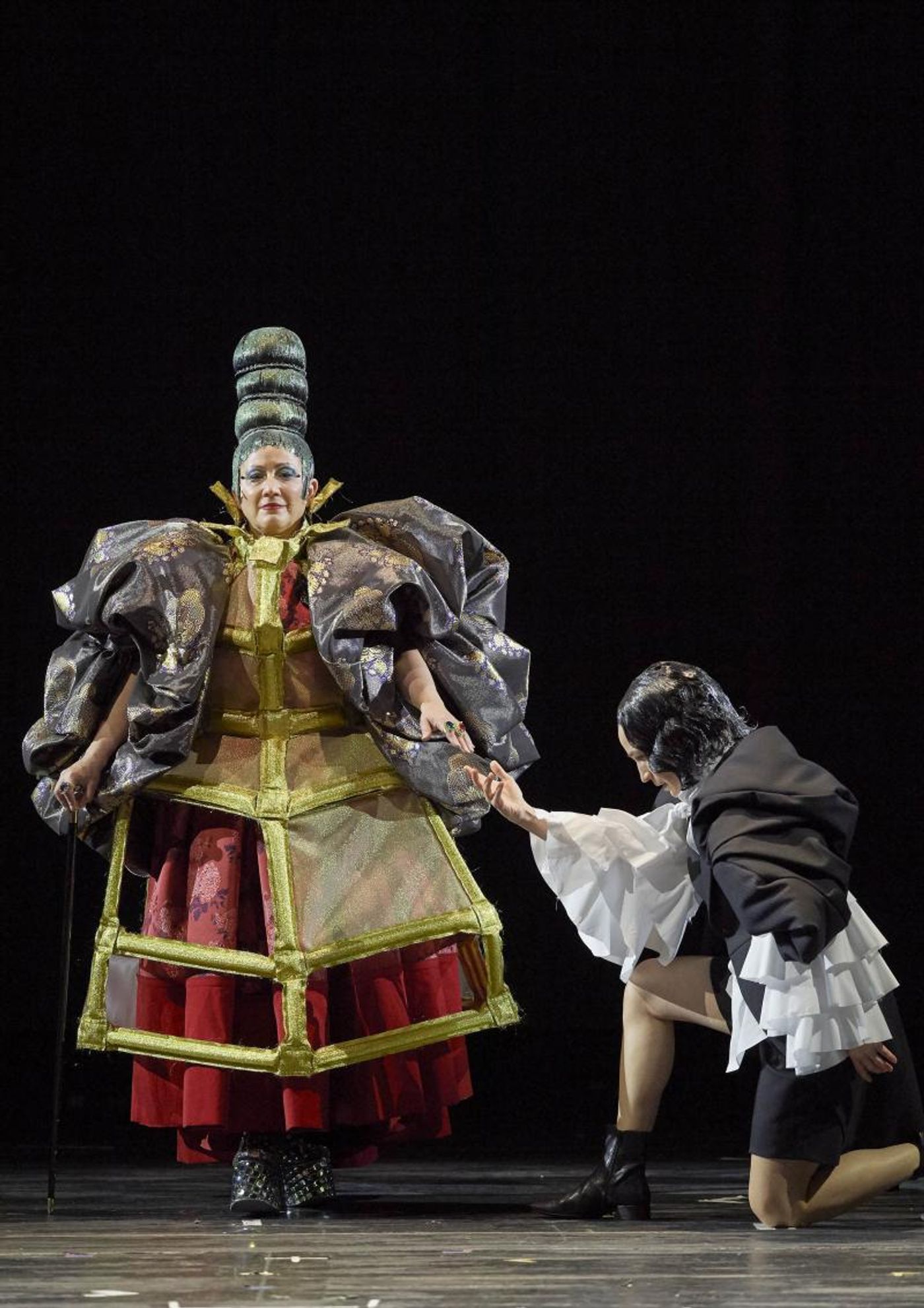
in Olga Neuwirth's Orlando. (c) Wiener Staatsoper / Michael Pöhn
Of course, all of this makes excellent fodder for a grand operatic stage drama, even more so in these modern times. Olga Neuwirth is a trailblazer, rabble-rouser and pioneer of the form for the 21st century, who takes her inspiration more from rebellious rock and roll icons such as Patti Smith and David Bowie than her opera peers of past or present. She had solidified her role as a global force to be reckoned with (like it, agree with it, appreciate it or not) with this historic achievement. The engagement was completely sold out for most of the run with live streaming offered from December 18-21st, thus enabling those who could not procure or afford a ticket (or a trip to Vienna) to still partake. Opinions of critics and attendees may have been divided but there is absolutely no doubt that the premiere of Neuwirth's Orlando caused quite a stir and sensation that rippled globally, beyond the usual scope of a new opera's opening.
When we met for our interview before the show, I noticed that Neuwirth possessed a quiet intensity and combustible energy in a petite-package akin to a ticking time-bomb poised to explode with ideas. It was a quick, yet candid conversation that was deeply satisfying and insightful. With short, dark curls that defy the laws of gravity and piercing pale blue eyes, she presented herself as a visionary creator who isn't afraid to get her hands dirty and be involved in every aspect of the process. "I'm sorry but I must get to the sound booth now," she explained when we parted ways and my companion and I were ushered to our seats.
Although she has a clear, strong sense of what she wants, opera is a collaborative art with many moving parts and egos too, plus being a commissioned piece from such a major institution can make compromises more prevailing than complete creative control. However, there were several significant elements and contributors which Neuwirth insisted upon that made Orlando stand out and updated their story to the 21st century. One was including veteran soprano Constance Hauman (they had worked together of Neuwirth's masterful and daring adaptation of the David Lynch film Lost Highway) who triples roles as Queen Elizabeth/Purity/Friend of Orlando's Child, a protege of Leonard Bernstein who was most recently on tour opening for George Clinton Parliament Funkadelic and is equally at home with classical music and indie rock. Another was engaging Rei Kawakubo, the founder of Comme des Garçons fashion empire who regularly plays with androgyny, shapes and silhouettes that vary from unusual to downright bizarre and call into question what is considered 'feminine' or 'attractive' to craft the deconstructed/reconstructed costumes. And the other was creating a role - Orlando's Child - for celebrated New York-based trans-genre singer, author and visual artist, and performer of stage and screen, Mx. Justin Vivian Bond, in their opera debut. Neuwirth had first encountered Mx. Bond at a Kiki and Herb performance in New York in 2007 and was instantly struck and smitten by their combination of art and activism. "I thought to myself 'oh my god what an audacious performer!'" Neuwirth recalled from her first encounter seeing Mx. Bond, "I was so intrigued and felt that this is an incredibly daring person who I felt very close to."
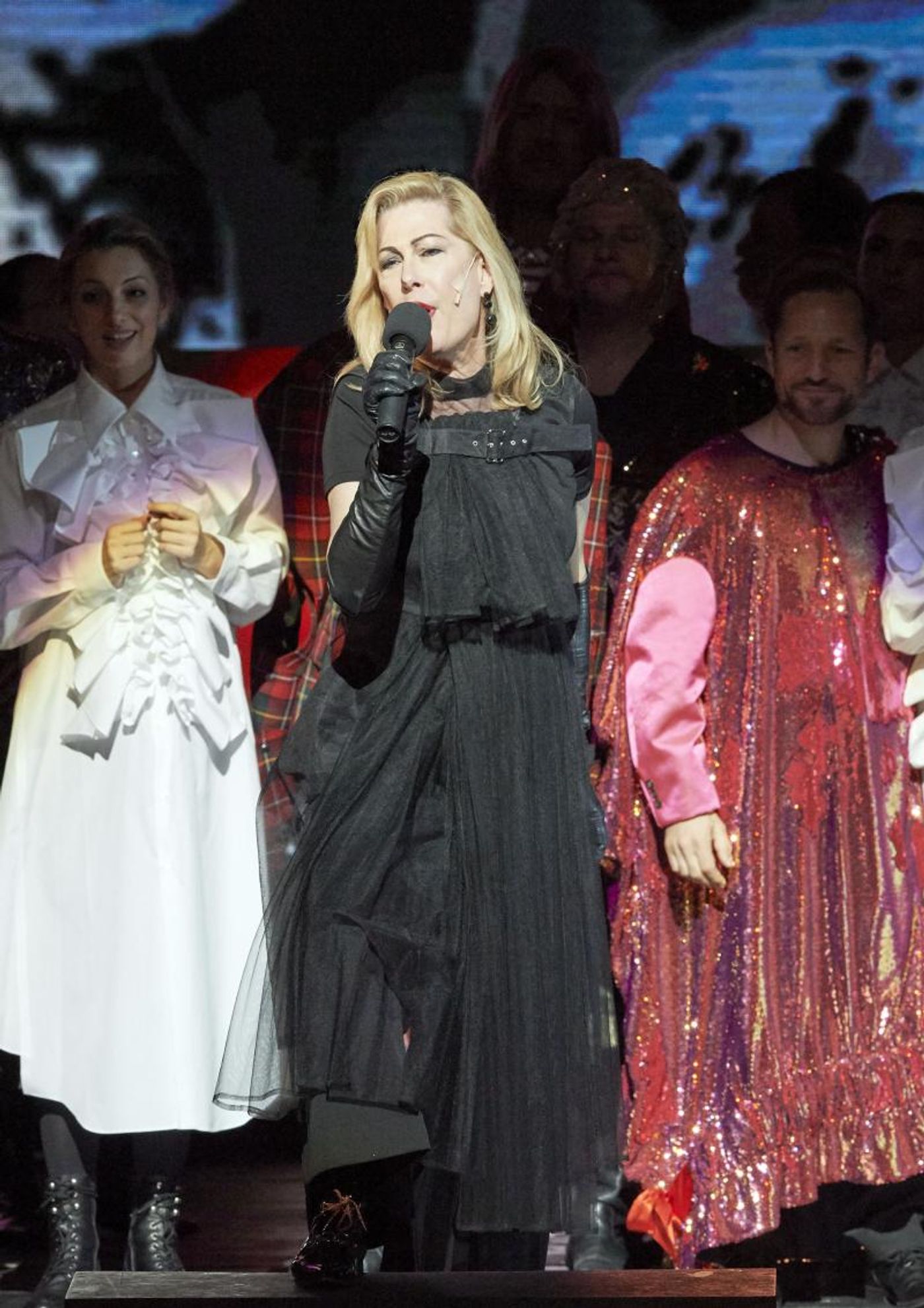
(c) Wiener Staatsoper / Michael Pöhn
Mx. Bond may appear larger-than-life when amongst the ordinary, but their striking presence is suitably 'opera-sized.' For a grand diva with too much glamour, pluck and personality for one gender, such a world of heightened drama and beauty is a comfortable fit, for they are much like the character of Orlando themselves. A balance of both masculine and feminine energies (leaning a bit more toward the femme side yet straddling each). They possess a certain je ne sais quoi that is written into the original character Virginia Woolf created - the brazen boldness of a man and the glamour, wit and seductiveness of a woman. It's no wonder they were hand-picked to represent the inheritance of Orlando's legacy for the contemporary era. "Virginia Woolf's Orlando was published in 1928 but if you think about it nowadays, Orlando's Child has to be a non-binary person. This is the consequence of Orlando as a man and woman existing in one person."
Orlando's Child (who appears in Act 2, fully-grown) is more of a spiritual child of Orlando and represents the next generation and evolution of Orlando. Their command of the attention of contemporary revelers by shouting expletives aimed squarely at "the patriarchy" and praising the joys of expressing one's authentic self is evocative of Mx. Bond's performance as the hostess of an underground free-love utopia in Brooklyn in John Cameron Mitchell's film Shortbus, but goes on further, deeper and picks up where Woof's potent messages of self-awareness and responsibility left off. The Child imparts wisdom upon the time-weary Orlando - drawing a comparison to Sondheim's "Children Will Listen" from Into the Woods, though in this case, it is the parent who must take heed. This also lays a foundation to represent the powerful uprising of the global youth of today who are sick of putting up with the forces that have been destroying the earth and humanity for far too long. Their fighting spirits figure heavily into the final scenes and underlying themes of Orlando, Part Two.
Neuwirth's interest in working with the legendary Comme des Garçons designer, Rei Kawakubo - whose creations were featured in an exhibition at the Metropolitan Museum of Art in 2017, followed by the 'Camp' theme in 2019 based on Susan Sontag's 1964 essay, (which has also been noted as a source of inspiration for Orlando) - began when she was a fifteen-year-old punk who played the trumpet growing up in the Austrian countryside that borders Slovenia. Neuwirth recalls the rigid roles enforced upon women in the form of expectations of dress and behaviors, which drove her to use clothing as a means to fight against the stiff gender differentiations and the conservative ways of society. "For me, fashion was a way to protest and show my rebellion," she observed. "Austria is not traditionally known for being such a fashion capital for women as places like France, for instance. I was searching for role models but didn't find any in classical composition, so I had to search for them somewhere else. I discovered them in literature, fashion, rock musicians and visual art from women artists or video pioneers." Of Rei Kawakubo's unconventional shapes, Neuwirth praised her innovation: "I admire radical female expressionists who question the norms of the body, what is considered 'attractive' beyond the male gaze and when what is expected from a woman's body is explored."
Of the costumes for Orlando themselves, she could not contain her enthusiasm and disbelief. "When I first saw the costumes I was completely overwhelmed because it was what I had dreamed of," Neuwirth extolled. "I had never thought that it would really work out because it's such a huge process, a lot of work, so many costumes. I thought that she would have referred to the other two collections from spring and autumn, but she made a whole new collection around the production. (The designs from Orlando were showcased at Paris Fashion Week in June and September 2019). It was very flattering, I am so touched and it was an incredible honor. As one can see these are unique costumes because she plays with form so much that they become sculptures, it's not even a human body anymore but a sculpture."
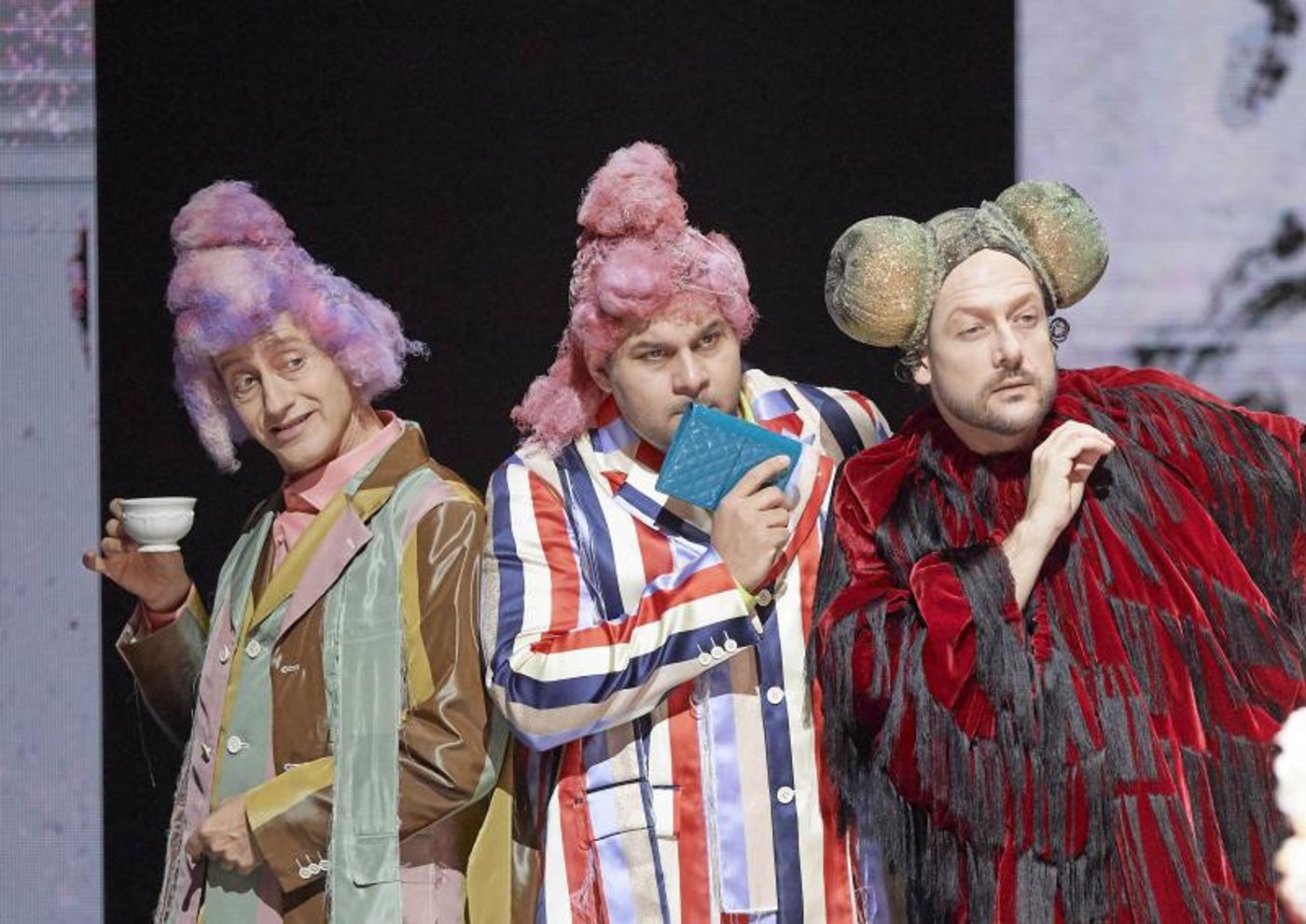
(c) Wiener Staatsoper / Michael Pöhn
For the set design, Neuwirth emphasized the importance of clearing the way to focus on the Comme des Garçons sculptural designs of living and moving art by simplifying the sets themselves by utilizing a modern version of a baroque theatre technique (also used in Kabuki theatre) of sliding panels to create spaces. Video content (by Will Duke) that covered various settings such as pastoral scenes, expansive manors, wintry wonderlands, footage of the war, conflict and even social media postings signified time and place in a story that spans hundreds of years. A dreidel (a nod to Neuwirth's Jewish heritage and the Hanukkah season) spun rapidly to demonstrate the passing of time between scenes. "I felt that this was enough and then the focus should be on the fashion and music," she noted.
Other top collaborators included the award-winning English opera and theatre director Polly Graham and German conductor (and a composer in his own right), Matthias Pintscher, who has known Neuwirth for 22 years. He calls her "courageous and straightforward", her music "diverse and dense" and of her distinctive vocal choices he sings her praises: "She covers the whole range, from boy soprano to bass baritone. The Guardian Angel is a countertenor, and Orlando isn't just any mezzo-soprano, she specifies very exactly what kind of mezzo-soprano she's thinking of. There's a children's chorus, and the division in the voices creates a fascinating spectrum of sound. The whole spectrum of vocal expression, I think that wealth is the right word. Then there's the Vienna Philharmonic, an orchestra with great awareness of the phenomenon of blending, it's very exciting." With the music being so varied and complex to the point of feeling at times irreverent and unpredictable though it is, in actuality, painstakingly precise, Pintscher himself acts like a ringleader of a circus, waving his baton furiously in a dramatic, balletic style to enchant a plethora of sounds as if he were commanding both a pack of wild beasts and precision-point professionals at once. The musicians and performers, along with the conductor, have to enact sonic backflips to keep up with the challenging score. The result is that the music becomes the emotional wings of the piece, carrying the listener on an epic journey.
To me, the soundscapes felt more reminiscent of Bjork's Dancer in the Dark, than the work of her classical and opera peers - with the use of both rich and sweeping orchestrations and resplendent, angelic voices (particularly the children's chorus who rotated locations and were even placed above the audience, giving an authentic sense of a cherubic choir) blended with pop and rock sensibilities, odd instrument sounds and clattering, clanking "found sounds" and the pervasive sense of tension and foreboding. This was also the case in the compositions for Lost Highway, but that stress revolved around extremes of murders and unsolvable mysteries. The prevalent apprehensive sounds explored in Orlando echoed the omnipresent anxiety bordering on neurosis that is prominent in the poet's thoughts as they try to make sense of the curiosities in human society around them. There are clopping sounds to evoke approaching horses that come from the side boxes and a great thud of microphoned boxing bag being hit. It's not pretty music and verges on cacophonous at times but it is all in the service of the story to provoke a sense of unease. Horns play a large part in the building and releasing of musical intensity, a nod to her early days as a trumpeter, but all of that is just the tip of the iceberg. In Neuwirth's own words: "The topic of Orlando is already androgyny, so perceptions have to shift constantly, nothing is a given. Everything is about 'trans' - transformation, transgression - so the same issues should be in the production of sound itself. For this, I have chosen what we call an 'old-fashioned orchestra' from what we have here at the opera house - but that too should be constantly questioned. The first violins and the second violins don't have the same tuning. The second violins are tuned lower so they create a kind of an 'issue', I would say, musically. Then in the pit, there is an electric guitar that doesn't have the same tuning as the orchestra but is tuned a chord higher than the orchestra and by virtue of being an electric, amplified instrument it is already also questioning its place in the traditional orchestra. Then there are two synthesizers which both produce different kinds of sounds, and I have a jazzy band onstage. So everything is already called into question by combining a variety of elements in the production of sound itself."
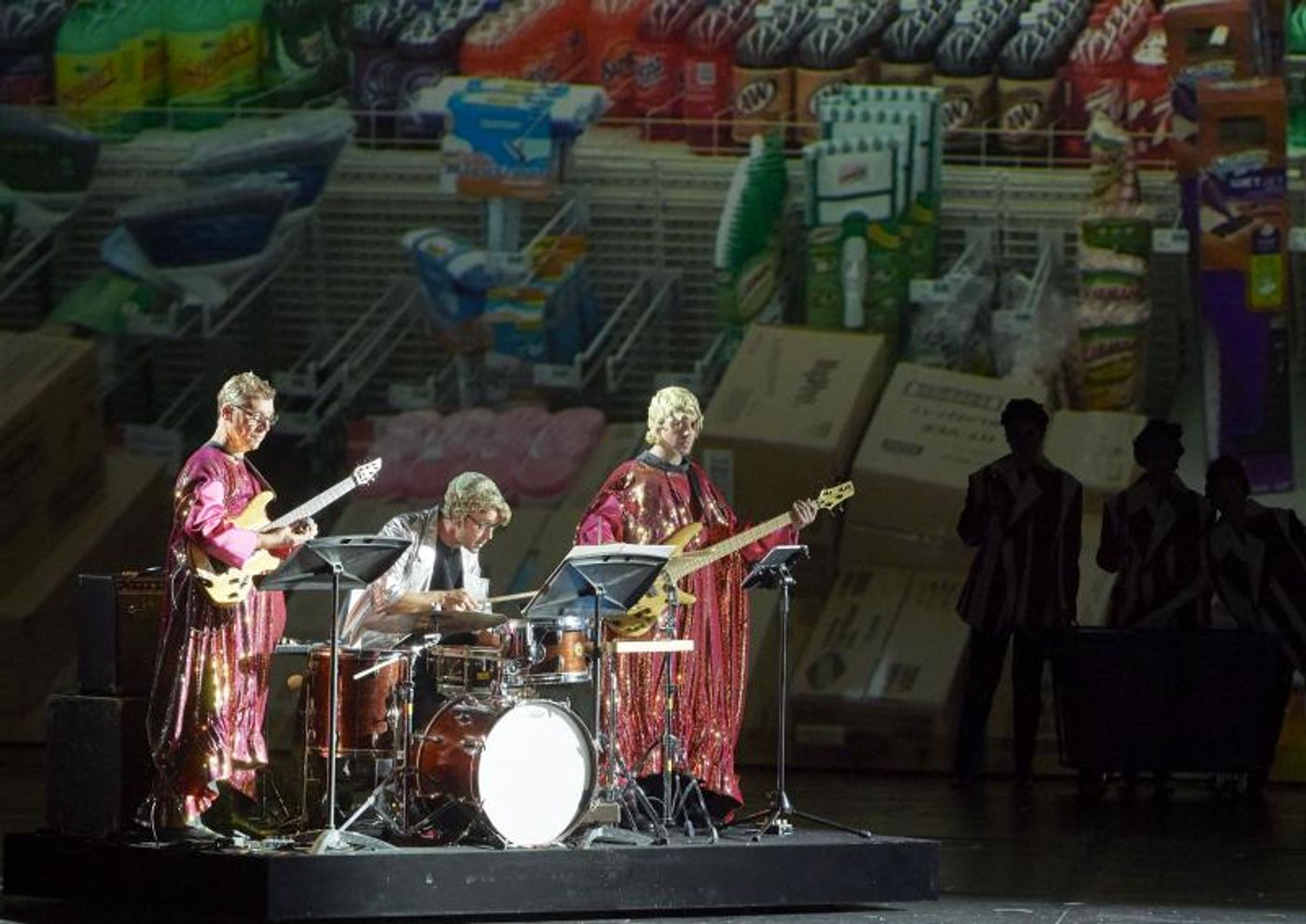
(c) Wiener Staatsoper / Michael Pöhn
Olga Neuwirth is a bold force and modern voice within the industry. Her version of Orlando resumes where Woolf's ended (1928, the author's contemporary time) and takes the character, their cohorts and adversaries all the way through the present and into the future. Orlando is performed by the remarkable mezzo-soprano Kate Lindsey, who is so exquisitely fluid in her portrayal of the highly sensitive, vocally and emotionally demanding role that one could float on her charisma or drown in her depths, sometimes forgetting just how difficult a position she has been placed in. For Lindsey has the heaviest burden to bear - if Orlando is unlikable, unbelievable or unsympathetic it simply will not work. Luckily for the viewers, Lindsey is an absolute delight to witness and hear, so Orlando's foibles become that much more captivating, no doubt influenced by the vocal acrobatics required of her. Act One is faithful to the original book with delightful pepperings of Woolf's own words and observations as told through the Narrator (performed by the prominent Italian-Swedish allround singer Anna Clementi) who acts as a charming guide and anchor to the opera as Woolf does in the tale. The hooded figure of contratenor Eric Jurenas as omnipresent the Guardian Angel offers an air of mystery while watching the strange circumstances unfold. Important events and figures come into play such as the Great Frost of 1608 which introduces Sasha - "The White Fox" - a Russian Princess who steals and then breaks the male Orlando's heart, performed by Agneta Eichenholz with icy splendor. Over a century later, Orlando entertains acclaimed poets Pope, Dryden and Addison in a fast-paced spirited segment where the poor thing is forced to play a tea-serving society lady fighting offers of marriage with a slimy toad instead of a shining rapier, when she'd rather be appreciated as an equal poet in her own right. The first act concluded with a harrowing scene set in the Victorian era where "an alarming increase of sexual assaults on children" opened Orlando's eyes to the betrayal of childhood innocence at the hands of evil men and echoed the breaking of victims' silence that has shaped the current #MeToo movement. The contratenor combined with the pajama-clad children's chorus, female chorus and the youthful Putto (a seraphim boy, played by Emil Lang) together reached a quivering vocal crescendo that rained down on patriarchal injustices to women and children like swords of soundwaves from avenging angels.
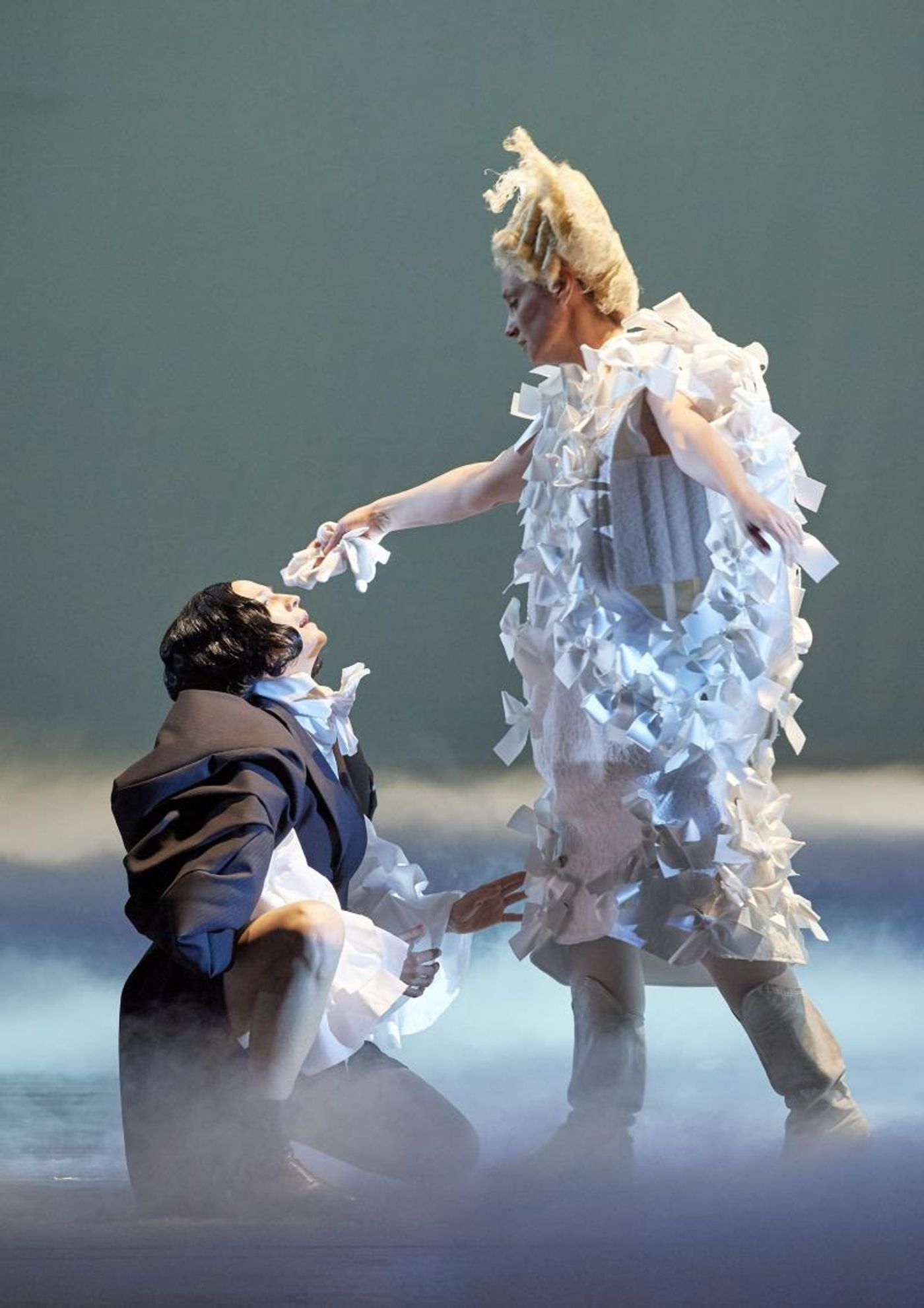
(c) Wiener Staatsoper / Michael Pöhn
Act Two is another entity entirely and attempts to cover Orlando's adventures in the 96 years that follow the novel's end into the present and beyond. It begins with Orlando trudging through the moors in 1917 with accompanying footage of WWI. There she meets Shelmerdine, a war photographer, they fall in love and marry. Shelmerdine was performed by Leigh Melrose, whose rich baritone was also lent to the role of Nick Greene - the double-crossing greedy poet from Orlando's early days as a young man who later becomes an e-book publisher in contemporary times. Their encounter (and duet) is beautiful, sincere, and a first for Orlando in female form but all too brief. What followed in rapid succession were vignettes of the atrocities of wars and the Holocaust; the counterculture and free love in the swinging '60s; punk rock and explorations of androgyny in '80s (where Orlando meets her girlfriend, played by Katie La Folle); swanky modern soirees in person and online where diversity and freedom of expression reign, and the character of Orlando's Child is introduced; all the way up to the clear and present threats currently posed by mob mentality, overconsumption and capitalism, climate change, xenophobia, intolerance, and the patriarchal far-right political parties who led with chants of "Us first" (an allusion to both the "Us vs Them" mentality and the "U.S. first" agenda of the Trump Administration) and are aiding in the earth's destruction and humanity's fall.
Trying to pack nearly 100 years into one act of an opera is no mean feat and there were certainly a lot of major events that have shaped and shaken the last century, but as a result, it could be a bit chaotic, meandering and hard to follow in contrast to the clarity of intentions in the first act. At times, it felt like a time machine with an alarm clock that would go off and change its place and era right as one was settling in. Even the Narrator reflected on the tensions created in this hyper-speed reality, and Orlando felt the aggravations as well. "Orlando refuses to accept this horrible new normalcy, although so many have been willingly falling into line. It was happening at tremendous speed, like a cognition," she declared. Indeed, this is an accurate reflection of how it feels to exist in these tempestuous times. All of this turmoil only further ignites Orlando's desire to write and act as a voice for the voiceless or silenced. However, toward the conclusion, it also became a bit heavy-handed with its messaging which, though potent and important, is often better imparted when shown, not shouted. Nevertheless, I liked the comment from a former student of Neuwirth, also a composer and music producer: "It is like an iron fist covered in nails and wrapped in a velvet glove." How's that for imagery?
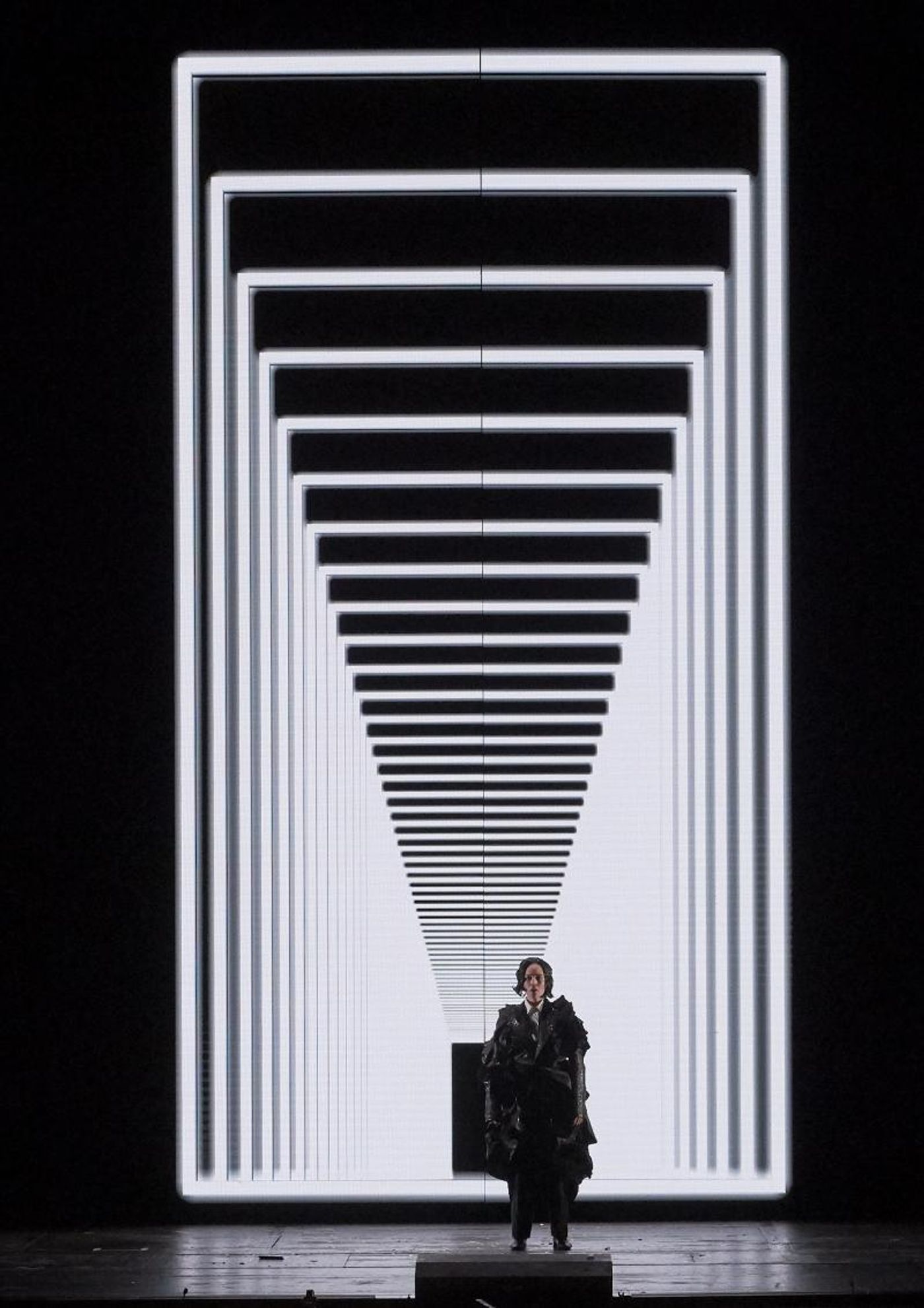
(c) Wiener Staatsoper / Michael Pöhn
Despite some drawbacks, Orlando was a deeply engaging, intriguing and thought-provoking exploration whose pondering, messages, striking soundscapes and visuals reverberated and lingered long after the curtain had closed. It is a highly ambitious undertaking but Neuwirth and her colleagues were up for the challenge. What is most exciting is what has now been established for a venue such as The Wiener Staatsoper as we move into a new decade of uncertain times when it is vital that radical expressions of art and activism combined are given such a grand stage with which to proclaim their truths.
Reader Reviews
Videos

